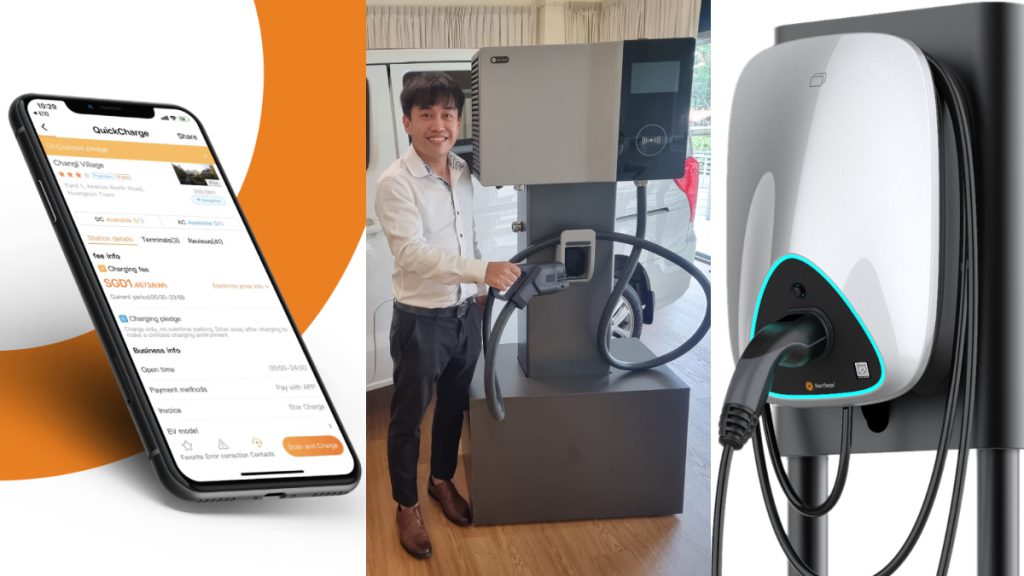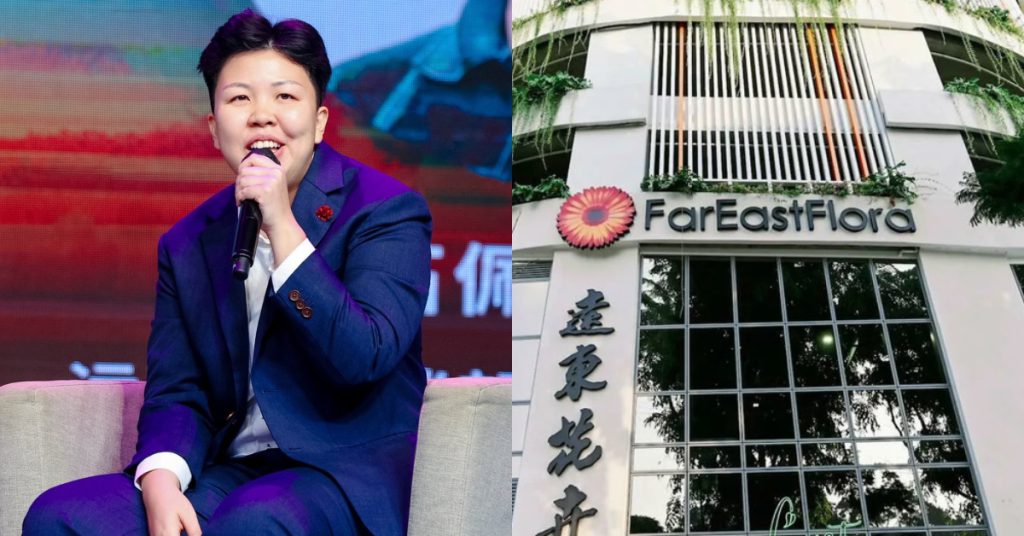Singapore startup QuickCharge aims to provide electric vehicle (EV) users with fast charging solutions right at their doorsteps.
Launched in June this year, they claim to be the country’s first EV charge point retailer and service provider with a unique “Charge & Earn” programme.
Their affiliate automotive company Hong Seh Motors is a seller of electric passenger and commercial vehicles as well as motorcycles. They decided to embark on this concept as they noticed the “chicken and egg issue” where the lack of available EV chargers hinders interested customers from actually going through with their EV purchases.
This comes as the Singapore government rolls out multiple incentives to encourage EV adoption in the nation. Various brands have followed suit and more EVs are launched in the market, but consumers are still not making the switch.
Locals are still unenthusiastic about making the switch from petrol vehicles to EVs partly due to cost of EVs and fears of charging inconvenience. As such, the need for charging infrastructure quickly becomes a pressing one.
Allowing EV charger owners to be ‘energy merchants’
QuickCharge came up with the “Charge & Earn” service to encourage public participation in building the EV community’s charging infrastructure.

This novel programme allows almost anyone to buy and install EV chargers in their property, and earn a passive income by selling energy to EV users. Charge point operators (CPOs) can adjust their EV chargers’ power, or speed, charging rate (price per kilowatt) and charging availability to fit their needs. EV drivers can locate charging points via the soon-to-launch QuickCharge app.
CPOs can adjust the charging rate, which can vary as some owners might have solar panels or other renewable charging sources that affect the base cost of energy. As of yet, there is no regulatory standardisation of charges on the app, but it is possible that regulations be meted out in future.
QuickCharge mainly targets shopping malls, country clubs, hotels and commercial buildings as their CPOs. However, anyone with the space can also buy chargers from the company and sell energy to all EV users.

Thus far, there are over 30 users who have installed QuickCharge’s EV chargers on their own premises, for both personal and commercial use, such as for fleets of commercial EVs.
Leslie Yap, 33, a sales consultant at QuickCharge, has sold six chargers in the past two months.
“The shipment for Tesla cars were recently delayed, but as these deliveries start to pick up, we’re seeing our sales grow too,” said Leslie, who now has nine charger installations in the pipeline.
Offering a range of EV chargers for private to commercial applications
To date, QuickCharge offers seven different EV chargers, with prices ranging from S$1,500 to S$14,990.
The KHONS 1 Phase and KHONS 3 Phase are two of the company’s first Energy Market Authority (EMA) Technical Reference 25 compliant portable chargers for on-the-go recharging. The Aurora 7/22 is a compact AC wall charger suitable for overnight charging in residential use. Their flagship DC quick charger, Venus 30, is suitable for private and commercial use.

Whereas their costlier larger models include the AC/DC charger, Jupiter 60, which is similar to what gas stations offer; as well as the Titan 180, a high power DC charger suitable for kiosks and businesses with electric heavy vehicles.
All chargers are compatible with both Type 2 and CCS2 connectors for all EV models, including commercial ones, as well as niche Japanese electric cars, like the Nissan Leaf, which uses a CHAdeMO connector. Owners can even request for the CHAdeMO connector if required.
The entire product range was created in partnership with China’s leading EV charger manufacturer, StarCharge. Interestingly, StarCharge is also the original equipment manufacturer (OEM) for renowned automotive companies including Porche, Audi, and BMW.
Who can own these EV chargers and potentially make a profit?
According to the current regulations, all EV chargers must be installed by a licensed electrical worker.
Individuals can own a charger even if they’re living in a condominium, but they require the prior approval from the MCST. On the other hand, private landed home owners can own an EV charger on their properties without getting an approval.
In the same vein, individual condo owners can reap profits from selling energy through “Charge & Earn”, if some conditions are met. For example, who reaps the profits is dependent on the scheme the owner signs up for.
There are different schemes available, with regards to ownership of the company’s chargers. These include full payment schemes, installment plans, 50-50 capital expenditures (CaPex), as well as zero per cent CaPex.
The net profit will be shared accordingly, based on the scheme chosen.
There is also no limit on how many chargers one person or entity can own. However, a building’s power supply and grid system can limit the amount of power that be provided to all the charging stations within the building.
“Currently, Housing Development Board (HDB) flat owners are unable to purchase or install our products in their estates. Public carparks are under tender projects launched by the Urban Redevelopment Authority (URA) and the Land Transport Authority (LTA),” clarified Lindy.
EV owners who live in HDB flats can still use the company’s services, by locating the nearest QuickCharge stations on their mobile app.
LTA’s new grant might bring QuickCharge to more condos
For residential users, Lindy Lee, assistant general manager of QuickCharge, said that EV charger installation is much simpler and straightforward in private landed homes than in non-landed private residences (NLPRs) such as condominiums and private apartments.
Installation in condominium carparks is a long process which requires prior approval from the Management Corporation Strata Title (MSCT), held in annual general meetings (AGM) with the committee.
However, condo owners might soon be seeing more EV chargers in their carparks. The LTA launched the Electric Vehicle Common Charger Grant (ECCG) on 29 July 2021 to encourage the installation of shared EV chargers in NLPRs. To date, QuickCharge is one of the few EV charger companies in Singapore eligible for the LTA ECCG.

As an early adopter incentive, the ECCG will co-fund installation costs of 2,000 EV chargers at NLPRs, which form a significant proportion of residences in Singapore. This will significantly improve charger provision and access as well as the overall coverage of Singapore’s national EV charging network.
The grant covers up to 50 per cent of the charging system, capped at S$4,000 per charger; 50 per cent of licensed electrical worker fees; and 50 per cent of cabling and installation works, capped at S$1,000.
The local government announced a 60,000 EV charging point deployment target by 2030, 20,000 of which will be in private premises, and 40,000 in public carparks.
Applications for the ECCG have already been open since 29 July 2021. However, this grant will only be made available until 31 December 2023, or until 2,000 chargers have been supported by co-funding, whichever comes first.
HDB owners, like private landed housing owners, are not eligible for the LTA ECCG, which is only applicable to NLPRs.
Smart chargers and their operators have to fulfill certain criteria, before gaining approval from the LTA.
More EV chargers in the pipeline
QuickCharge said it will be unveiling their new advanced high power charging system, the Nova 360. This DC charger offers greater scalability with up to six charging points per cabinet, and is suitable for commercial use in depots, for example.

The team is heavily involved in conducting regular market research and surveys to better understand the needs of its users. They hope to cater to more users beyond the confines of electric cars, to include more electric vans, lorries, trucks, and buses.
With a team of six sales consultants and counting, QuickCharge aims to expand their product and service offerings and be Singapore’s one-stop solution for EV charging needs.
It will be quite exciting to see how QuickCharge’s “Charge & Earn” programme works out for users once their mobile app is ready.
Electric vehicles is a key content pillar for Vulcan Post. You can find the rest of our EV coverage here.
VP Label puts together all the best local products for you to discover in one place. Join us in supporting homegrown Singaporean brands:
Featured Image Credit: QuickCharge











